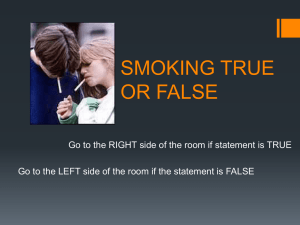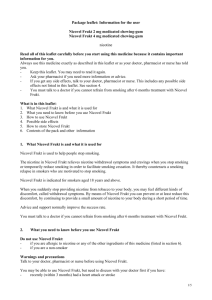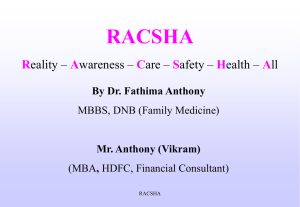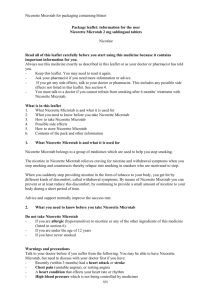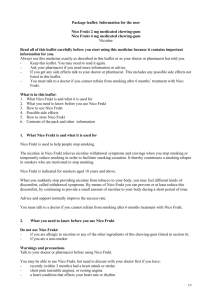Nicachet 4 mg Oromucosal powder in pouch ENG PL
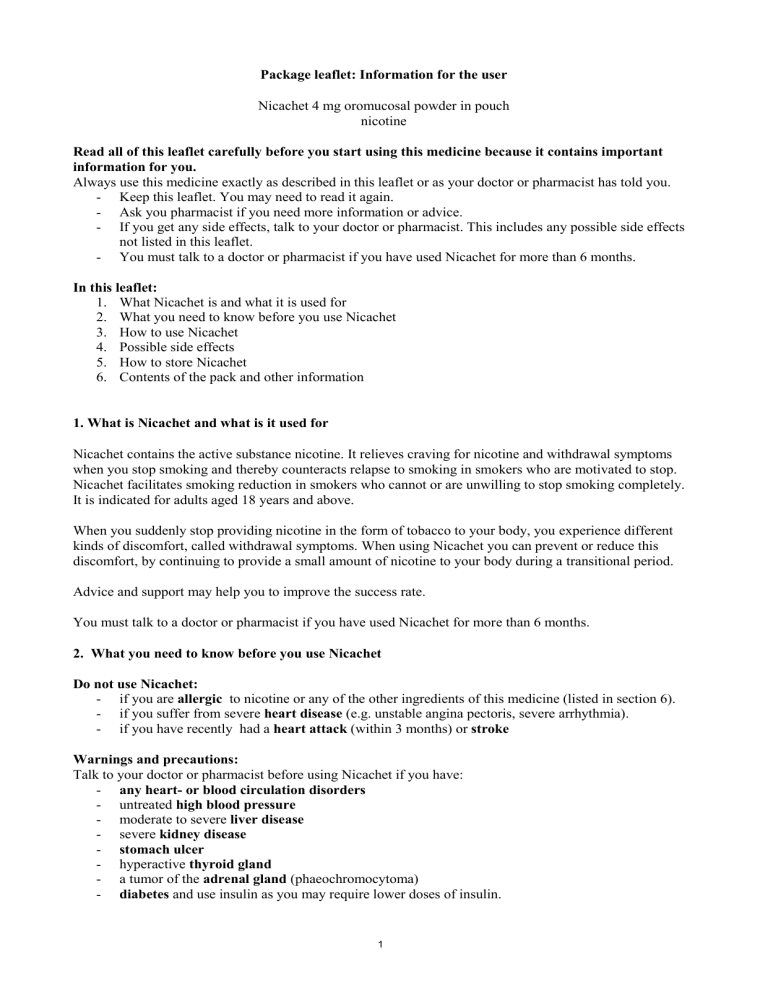
Package leaflet: Information for the user
Nicachet 4 mg oromucosal powder in pouch nicotine
Read all of this leaflet carefully before you start using this medicine because it contains important information for you.
Always use this medicine exactly as described in this leaflet or as your doctor or pharmacist has told you.
Keep this leaflet. You may need to read it again.
Ask you pharmacist if you need more information or advice.
If you get any side effects, talk to your doctor or pharmacist. This includes any possible side effects not listed in this leaflet.
You must talk to a doctor or pharmacist if you have used Nicachet for more than 6 months.
In this leaflet:
1.
What Nicachet is and what it is used for
2.
What you need to know before you use Nicachet
3.
How to use Nicachet
4.
Possible side effects
5.
How to store Nicachet
6.
Contents of the pack and other information
1. What is Nicachet and what is it used for
Nicachet contains the active substance nicotine. It relieves craving for nicotine and withdrawal symptoms when you stop smoking and thereby counteracts relapse to smoking in smokers who are motivated to stop.
Nicachet facilitates smoking reduction in smokers who cannot or are unwilling to stop smoking completely.
It is indicated for adults aged 18 years and above.
When you suddenly stop providing nicotine in the form of tobacco to your body, you experience different kinds of discomfort, called withdrawal symptoms. When using Nicachet you can prevent or reduce this discomfort, by continuing to provide a small amount of nicotine to your body during a transitional period.
Advice and support may help you to improve the success rate.
You must talk to a doctor or pharmacist if you have used Nicachet for more than 6 months.
2. What you need to know before you use Nicachet
Do not use Nicachet:
if you are allergic to nicotine or any of the other ingredients of this medicine (listed in section 6).
if you suffer from severe heart disease (e.g. unstable angina pectoris, severe arrhythmia).
if you have recently had a heart attack (within 3 months) or stroke
Warnings and precautions:
Talk to your doctor or pharmacist before using Nicachet if you have:
any heart- or blood circulation disorders
untreated high blood pressure
moderate to severe liver disease
severe kidney disease
stomach ulcer
hyperactive thyroid gland
a tumor of the adrenal gland (phaeochromocytoma)
diabetes and use insulin as you may require lower doses of insulin.
1
Nicachet should not be used by non-smokers.
Children and adolescents
Children and adolescents under 18 years of age should not use Nicachet, unless prescribed by a doctor.
A normal dose for adults could seriously poison or even kill a small child. It is therefore important that you keep Nicachet out of the sight and reach of children at all times.
Other medicines and Nicachet
Tell your doctor or pharmacist if you are taking, have recently taken, or might take any other medicines.
This is specially important if you use other medicines that contain
teophylline (to treat asthma)
-tacrine (for Alzheimer’s disease)
-clozapine (for schizophrenia)
-ropinirole (to treat Parkinson’s disease)
Nicachet with food and drink
You should not eat or drink with the pouch in your mouth, since this may decrease the effect of Nicachet.
Acidic drinks ( e.g. coffee, fruit juice, or soda) influence the uptake of nicotine in the mouth cavity.
To make sure that the best effect will be achieved, you should avoid these drinks within approximately 15 minutes before using Nicachet.
Pregnancy and breast-feeding
If you are pregnant or breast-feding, think you may be pregnant or are planning to have a baby, ask your doctor or pharmacist for advice before using this medicine.
It is very important to stop smoking during pregnancy since smoking can result in poor growth of your baby.
It can also lead to premature births and even stillbirths. Ideally you should stop smoking without the use of medicines containing nicotine. If you cannot manage this, Nicachet should only be used after consulting the healthcare professional who is managing your pregnancy, your doctor, or a doctor that is specialised in helping people quit smoking.
Nicachet should be avoided during breast-feeding as nicotine passes into breast milk and this may affect your child. If your doctor has recommended you to use Nicachet during breast-feeding, it should be taken immediately after breastfeeding and not within two hours before breastfeeding.
Driving and using machines
Nicachet has no or negligible influence on the ability to drive and use machines.
3. How to use Nicachet
Always use this medicine exactly as described in this leaflet or as your doctor or pharmacist has told you.
Check with your doctor or pharmacist if you are not sure.
The recommended dose at the beginning of the treatment is 1 pouch to be used every to every second hour.
8 -12 pouches per day is normally sufficient. Do not use more than 24 pouches per day.
Place the pouch under the upper lip and keep it there for approximately 30 minutes. Occasionally move the pouch around with the tongue.
The onset of effect when using Nicachet is not as fast as when smoking and therefore you cannot expect to experience the same rapid satisfaction as when smoking.
Do not use Nicachet for more than 6 months without consulting your doctor or pharmacist. Regular use of
Nicachet for more than 1 year is generally not recommended.
2
Smoking cessation
The duration of treatment is individual, but should normally continue for at least 3 months. Thereafter the number of pouches per day should be reduced gradually. Therapy should be stopped when the dose has been decreased to 1-2 pouches per day. You may however use a pouch when you are tempted to smoke.
Smoking reduction
Nicachet can be used in between periods of smoking, in order to prolong smoking–free intervals with the intention to reduce smoking as much as possible. If you, after 6 weeks, have not succeeded to cut down the number of cigarettes per day you should seek professional help. You should try to stop smoking as soon as you feel motivated, however no later than 6 months after you started to use Nicachet. If you do not succeed to make a serious attempt to stop smoking within 9 months you should seek professional help.
If you use more Nicachet than you should
Overdose with nicotine could occur if you are only used to low doses of nicotine or if you smoke when using
Nicachet.
The symptoms of overdose include nausea, salivation, abdominal pain, diarrhoea, sweating, headache, dizziness, hearing disturbances and pronounced weakness (feeling of weakness). At high doses, these symptoms may be followed by low blood pressure, weak and irregular pulse, difficulty in breathing, extreme tiredness, circulatory collapse and general convulsions.
If a child takes Nicachet or if you use too much nicotine, contact your doctor or the emergency department at the hospital immediately for evaluation of risk and for advice.
If you have any further questions regarding the use of this medicine, please contact you doctor or pharmacist.
4. Possible side effects
Like all medicines, this medicine can cause side effects, although not everybody gets them.
Niqopods mint may cause the same side effects as nicotine administered in other forms. Side effects are generally dose dependent. See also section “If you use more Nicachet than you should.”
Stop taking Nicachet and see a doctor immediately if you experience any of the following symptoms of allergic reactions, which can be serious, such as angioedema. These are rare side effects (may affect up to 1 in 1000 people):
-swollen face, tongue or throat
-difficulty to swallow
-hives and difficulties to breathe
Other side effects are:
Common: may affect up to 1 in 10 people
Dizziness, headache, gastrointestinal discomfort, hiccups, nausea, vomiting, irritated mouth or throat
Uncommon: may affect up to 1 in 100 people
Palpitations (feeling fast or irregular heartbeat), skin redness and hives
Rare: may affect up to 1 in 1000 people
Disturbances in heartbeat
Some symptoms such as dizziness, headache and sleeping disturbances may be caused by withdrawal symptoms during smoking cessation and are caused by a decreased supply of nicotine.
Canker sores (painful ulcers in the mucosa of the mouth) can appear when you stop smoking but the connection to smoking cessation is unclear.
3
Reporting of side effects
If you get any side effects, talk to your doctor or pharmacist or nurse. This includes any possible side effects not listed in this leaflet. You can also report side effects directly (see details below). By reporting side effects you can help provide more information on the safety of this medicine.
[To be completed nationally]
5. How to store Nicachet
Keep this medicine out of the sight and reach of children.
Do not store above 30ºC.
Keep the container tightly closed in order to protect from moisture.
Do not use this medicine after the expiry date which is stated on the envelope and container after EXP. The expiry date refers to the last day of that month.
Do not throw away any medicines via wastewater or household waste. Ask you pharmacist how to throw away medicines you no longer use. These measures will help protect the environment.
6. Contents of the pack and other information
What Nicachet contains
The active substance is nicotine. One pouch contains 4 mg nicotine.
The other ingredients are: alginic acid, anhydrous sodium carbonatecopovidone, powdered cellulose, peppermint flavour and neohesperidindihydrochalcone.
What Nicachet looks like and the contents of the pack
Nicachet is a rectangular pouch filled with powder.
Package size:
20 pouches in a polypropene container with childproof lid in a laminated aluminium envelope.The pouch is made of non-woven fabric composed of viscose and an acrylic binder.
Marketing Authorisation Holder and Manufacturer
[To be completed nationally]
This medicinal product is authorised in the Member States of the EEA under the following names:
This leaflet was last revised in
23 May 2014
4
